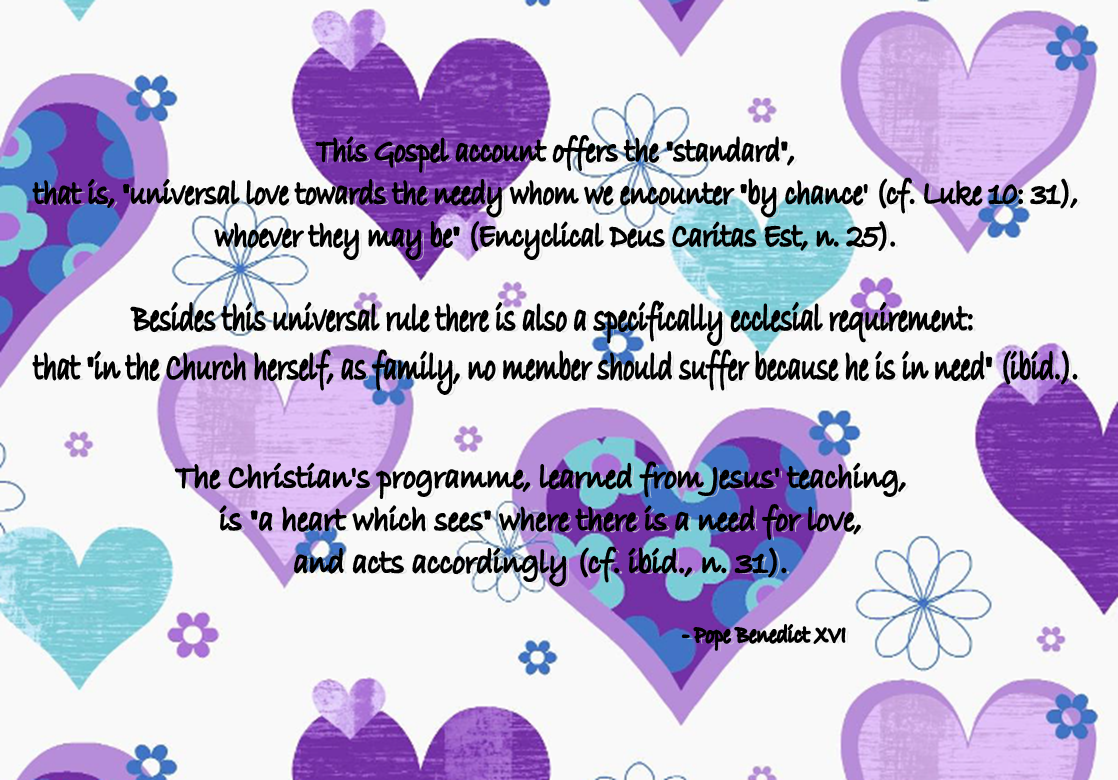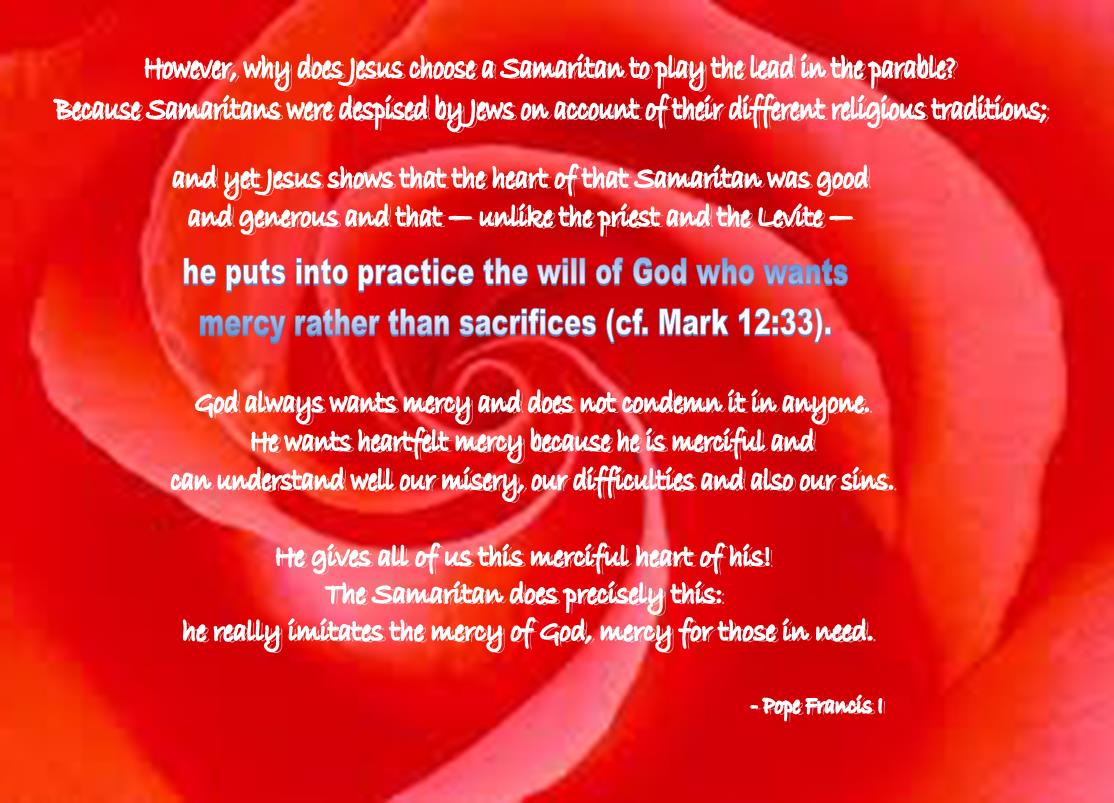|
30 |

|
Every good Christian knows that vacations are an appropriate time for relaxation and also the nourishment of the spirit through more extended periods of prayer and meditation, in order to grow in one's personal relationship with Christ and to conform increasingly to his teachings.
Today, for example, the liturgy invites us to reflect on the famous Parable of the Good Samaritan (cf. Luke 10: 25-37), which introduces us into the heart of the Gospel message: love for God and love for neighbour. But the person speaking to Jesus asks: who is my neighbour? And the Lord answers by reversing the question and showing through the account of the Good Samaritan that each one of us must make himself close to every person he meets: "Go and do likewise" (Luke 10: 37).
Loving, Jesus says, means acting like the Good Samaritan. And we know that he himself is the Good Samaritan par excellence; although he was God, he did not hesitate to humble himself to the point of becoming a man and giving his life for us.
Love is therefore the "heart" of Christian life; indeed, love alone, awakened in us by the Holy Spirit, makes us Christ's witnesses.
I wanted to present this important spiritual truth anew in my Message for the 23rd World Youth Day which will be released next Friday, 20 July: "You will receive power when the Holy Spirit has come upon you; and you will be my witnesses (Acts 1: 8).
This is the theme on which, dear young people, I ask you to reflect in the coming months in order to prepare yourselves for the great event that will take place in Sydney, Australia, in a year's time, precisely in these July days. The Christian communities of that beloved Nation are working hard to welcome you and I am grateful to them for the efforts they are making to organize it.
Let us entrust to Mary, whom tomorrow we shall invoke as Our Lady of Mount Carmel, the process of preparation for the next meeting of youth from across the world, to which I invite you, dear friends from every continent, to take part in large numbers.
Thank you once again for coming! I wish you all a good Sunday!
Acknowledgment: We thank the Vatican Publisher for allowing us to publish the Homily of Pope Benedict XVI, so that it could be accessed by more people all over the world; as a source of God’s encouragements to all of us.
BENEDICT XVI ANGELUS Courtyard of the Papal Residence, Castel Gandolfo (Video)
Dear Brothers and Sisters,
A few days ago, as you see, I left Rome for my summer stay at Castel Gandolfo. I thank God who has offered me this possibility of rest. I extend my cordial greeting to the beloved habitants of this beautiful little town, to which I always return willingly. This Sunday's Gospel begins with the question that a lawyer asks Jesus: "Teacher, what shall I do to inherit eternal life?" (Luke 10: 25). Knowing him to be expert in Sacred Scripture, the Lord asks this man to give the reply himself; indeed, he formulates it perfectly, citing the two main commandments: you shall love the Lord your God, with all your heart, and with all your mind and with all your strength, and love your neighbour as yourself. Then the lawyer, as if to justify himself, asks: "And who is my neighbour?" (Luke 10: 29). This time, Jesus answers with the famous words of the "Good Samaritan" (cf. Luke 10: 30-37) in order to show that it is up to us to make ourselves the neighbour of all who are in need of help. In fact, the Samaritan takes charge of the condition of a stranger whom robbers have left half dead on the wayside; while a priest and a Levite had passed him by, perhaps thinking, on account of a precept, that they would be contaminated by the contact with blood. The Parable must therefore induce us to change our mind-set in accordance with the logic of Christ, which is the logic of charity: God is love, and worshipping him means serving our brethren with sincere and generous love. |

|
This Gospel account offers the "standard", that is, "universal love towards the needy whom we encounter "by chance' (cf. Luke 10: 31), whoever they may be" (Encyclical Deus Caritas Est, n. 25). Besides this universal rule there is also a specifically ecclesial requirement: that "in the Church herself, as family, no member should suffer because he is in need" (ibid.). The Christian's programme, learned from Jesus' teaching, is "a heart which sees" where there is a need for love, and acts accordingly (cf. ibid., n. 31).
Dear friends, I would also like to recall that today the Church commemorates St Benedict of Norcia the great Patron of my Pontificate the father and legislator of Western monasticism. As St Gregory the Great recounts, "He was devout and religious... by name and through grace" (Dialogues, II, 1: Bibliotheca Gregorii Magni IV, Rome 2000, p. 136). "He wrote a rule for his monks... both excellent for discretion and also eloquent for its style": indeed, "the holy man could not otherwise teach, than he himself had lived". (ibid., II, XXXVI: op. cit., p. 208). Pope Paul VI proclaimed St Benedict the Patron of Europe on 24 October 1964, recognizing the marvellous work he did for the formation of the European civilization.
Let us entrust to the Virgin Mary our journey of faith and, in particular, this holiday period, so that our hearts may never lose sight of the Word of God and of the brothers and sisters in difficulty.
After the Angelus :
I am happy to greet all the English-speaking pilgrims and visitors present for this Angelus prayer. Today's Liturgy reminds us that to be Christians means to be faithful to the words and example of Jesus, especially by living a life of love of God and neighbour. May the Lord give us grace and courage so that we may always respond generously, as good Samaritans, to the needs of all who suffer, near and far. I wish you all a pleasant stay in Castel Gandolfo and Rome, and a blessed Sunday!
Acknowledgment: We thank the Vatican Publisher for allowing us to publish the Homily of Pope Benedict XVI, so that it could be accessed by more people all over the world; as a source of God’s encouragements to all of us.
POPE FRANCIS ANGELUS Castel Gandolfo
Dear Brothers and Sisters, Good morning,
Today our Sunday meeting for the Angelus is taking place here in Castel Gandolfo. I greet the inhabitants of this beautiful little town! Above all, I would like to thank you for your prayers, and I do this with all of you who have come here in large numbers as pilgrims. |

|
Today’s Gospel — we are at Chapter 10 of Luke — is the famous Parable of the Good Samaritan. Who was this man? He was an ordinary person coming down from Jerusalem on his way to Jericho on the road that crosses the Judean Desert. A short time before, on that road a man had been attacked by brigands, robbed, beaten and left half dead by the wayside. Before the Samaritan arrived, a priest as well as a Levite had passed by, that is, two people associated with worship in the Lord’s Temple. They saw the poor man, but passed him by without stopping. Instead, when the Samaritan saw that man, “he had compassion” (Luke 10:33), the Gospel says. He went to him and bound up his wounds, pouring oil and wine on them; then he set him on his own mount, took him to an inn and paid for his board and lodging... in short, he took care of him: this is the example of love of neighbour. However, why does Jesus choose a Samaritan to play the lead in the parable? Because Samaritans were despised by Jews on account of their different religious traditions; and yet Jesus shows that the heart of that Samaritan was good and generous and that — unlike the priest and the Levite — he puts into practice the will of God who wants mercy rather than sacrifices (cf. Mark 12:33). God always wants mercy and does not condemn it in anyone. He wants heartfelt mercy because he is merciful and can understand well our misery, our difficulties and also our sins. He gives all of us this merciful heart of his! The Samaritan does precisely this: he really imitates the mercy of God, mercy for those in need.
A man who lived to the full this Gospel of the Good Samaritan is the Saint we are commemorating today: St Camillus de Lellis, Founder of the Clerks Regular Ministers to the Sick, Patron of ill people and health-care workers. St Camillus died on 14 July 1614: this very day his fourth centenary is being inaugurated and will end in a year. I greet with deep affection all the spiritual sons and daughters of St Camillus who live by his charism of charity in daily contact with the sick. Be “Good Samaritans” as he was! And I hope that doctors, nurses and all those who work in hospitals and clinics may also be inspired by the same spirit. Let us entrust this intention to the intercession of Mary Most Holy.
Moreover I would like to entrust another intention to Our Lady, together with you all. The World Youth Day in Rio de Janeiro is now at hand. One can see that there are many young people here, but you are all young at heart! I shall leave in a week, but many young people will set out for Brazil even sooner. Let us therefore pray for this great pilgrimage which is beginning, that Our Lady of Aparecida, Patroness of Brazil, may guide the footsteps of the participants and open their hearts to accepting the mission that Christ will give them.
After the Angelus
Dear Brothers and Sisters, I join in prayer the Prelates and faithful of the Church in Ukraine, gathered in the Cathedral of Lutsk for a Holy Mass of suffrage on the 70th anniversary of the Volhynia massacres. These acts, incited by the nationalist ideology in the tragic context of the Second World War, took a toll of tens of thousands of victims and wounded the brotherhood of two peoples, the Polish and the Ukrainian. I entrust the victims’ souls to God’s mercy and for their peoples I ask the grace of profound reconciliation and a serene future in hope and in sincere collaboration for the common edification of the Kingdom of God.
I am also thinking of the Pastors and faithful who are taking part in the pilgrimage of the Family of Radio Maria to Jasna Góra, Częstochowa. I entrust you to the protection of the Mother of God and impart to you a heartfelt blessing.
I greet with affection the faithful of the Diocese of Albano! I invoke upon them the protection of St Bonaventure, their Patron, whose feast the Church will be celebrating tomorrow. May it be a beautiful feast with my good wishes! I should like to send you a cake, but I do not know whether such a big one can be made. I greet all the pilgrims who are present here: the parish groups, the families, the young people, especially those who have come from Ireland; and the deaf young people who are taking part in an international meeting in Rome.
I greet the Sisters of St Elizabeth, to whom I wish a fruitful spiritual renewal; the Apostles of the Sacred Heart of Jesus, with families from various nations; the Daughters of Divine Charity, celebrating their General chapter; and the Superiors of the Daughters of Our Lady, Help of Christians. I wish you all a good Sunday and a good lunch!
Acknowledgment: We thank the Vatican Publisher for allowing us to publish the Homily of Pope Francis I, so that it could be accessed by more people all over the world; as a source of God’s encouragements to all of us. 20 July 2013 |
